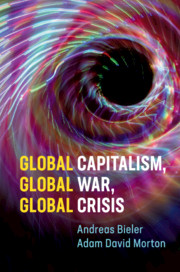Book contents
- Global Capitalism, Global War, Global Crisis
- Global Capitalism, Global War, Global Crisis
- Copyright page
- Dedication
- Contents
- Tables
- Figures
- Acknowledgements
- Abbreviations
- Introduction
- Part I Conceptual Reflections
- Part II Thematic Considerations
- Part III Empirical Interventions
- Conclusion
- Bibliography
- Index
4 - Capitalist Expansion, Uneven and Combined Development and Passive Revolution
from Part II - Thematic Considerations
Published online by Cambridge University Press: 30 April 2018
- Global Capitalism, Global War, Global Crisis
- Global Capitalism, Global War, Global Crisis
- Copyright page
- Dedication
- Contents
- Tables
- Figures
- Acknowledgements
- Abbreviations
- Introduction
- Part I Conceptual Reflections
- Part II Thematic Considerations
- Part III Empirical Interventions
- Conclusion
- Bibliography
- Index
Summary
Having established the argument for a necessarily historical materialist moment in understanding ‘the international’ (Chapter 1) and discussed the related implications for the issue of agency and structure (Chapter 2) and the material structure of ideology (Chapter 3), we are now in a position to develop the thematic basis for understanding Global Capitalism, Global War, Global Crisis from a historical materialist perspective. In this chapter, our focus is on debates about the historical emergence of the international states system and the rise of capitalism. The first section contains an excursus on what we regard as several false starts on the origins of capitalist development through the approaches of Barrington Moore on the making of the modern world, Immanuel Wallerstein on the modern world system and Giovanni Arrighi on the origins of our times linked to the analysis of capitalist and territorialist logics. In the subsequent section, we develop our own understanding of the emergence of capitalism. Following Robert Brenner's social property relations approach, we emphasise how capitalism became initially organised around wage labour and the private ownership of the means of production in England and the Netherlands. In turn, capitalism was propelled outward within an already existing interstate system (see Lacher, 2006; Teschke, 2003) along lines of uneven and combined development as a structuring principle of ‘the international’ (see Anievas and Nişancıoğlu, 2015). In the third section, a more detailed focus on and appreciation of the theory of uneven and combined development is presented, going beyond the assumption that it is a ‘rather fragmentary and undeveloped conception’ in the work of Leon Trotsky (Romagnolo, 1975: 8 n.2). Specific emphasis is placed on addressing the charge of Eurocentrism against the social property relations approach.
The fourth section of this chapter seeks to address three lines of criticism in the literature around uneven and combined development. First, there is no fully reconstructed theory within the original approach to uneven and combined development and, by extension, contemporary approaches to uneven and combined development have not been adequate in ‘accounting for both the spatio-temporal dynamics of capitalist development and the causal effects of socio-political multiplicity’ (Rioux, 2015: 494, original emphasis).
- Type
- Chapter
- Information
- Global Capitalism, Global War, Global Crisis , pp. 79 - 106Publisher: Cambridge University PressPrint publication year: 2018

